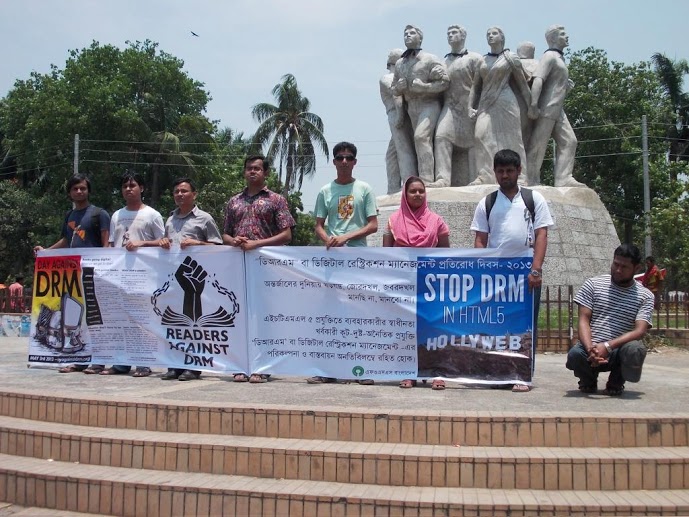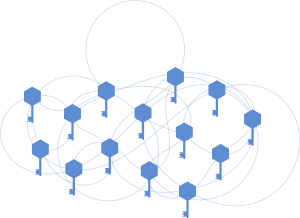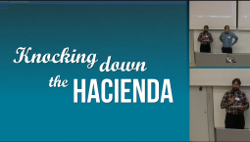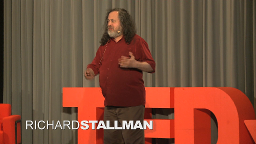|
(en) A lebanese Java User Group at Cnam Liban university. Articles in English or French. (fr) Groupe d'utilisateurs Java Liban. Articles en français ou anglais. This blog is the index toward contents (in general) on others sites. It helps the Group to stress on current activities.
samedi 30 août 2014
Free Software Supporter - Issue 77, August 2014
jeudi 21 août 2014
GNU hackers discover HACIENDA government surveillance and give us a way to fight back
|
mardi 19 août 2014
Richard Stallman's TEDx video: "Introduction to free software and the liberation of cyberspace"
| Dear Pascal, Are you in search of an easy way to explain to others what free software is and why it matters? Or are you perhaps wondering why you yourself should be concerned about computer-user freedom? If your answer is yes, then this TEDx talk by FSF president Richard Stallman (RMS) is what you're looking for!
RMS was invited to give a TEDx talk at "FREEDOM (@ digital age)" in April and took the opportunity to explain the fundamentals of the free software movement to the general public. In this speech, RMS introduces the issue and makes the stakes clear; he explains what a computer is and who controls it, what the various implications of free software and of proprietary software are for you, the user, what you can do to stop being a victim, what the obstacles to computer-user freedom are, and how you can make a difference. The TEDx talks are "designed to help communities, organizations, and individuals to spark conversation and connection through local TED-like experiences." At these events, screenings of videos, like this one, "or a combination of live presenters and TED Talks videos — sparks deep conversation and connections at the local level." We hope you share the recording, to help raise awareness and inspire conversations and connections in your own circles, and introduce a friend, loved one, or acquaintance, to this "first step in the liberation of cyberspace." If you watch any TEDx talks on YouTube, please remember to use a free program like youtube-dl instead of your browser, because watching YouTube in your browser requires proprietary JavaScript. Many thanks to Théo Bondolfi, François Epars, Florence Dambricourt, and the TEDxGeneva core-team for making this speech possible. Thank you to Ynternet.org and HEG-GE for hosting and supporting the event, and to Sylvain & Co., La Belle Bleue, and Jus de Fruits Suisses, ProLibre, and the Fondation Emilie Gourd, Piguet Galland & Cie., Lifelong Learning Programme, Hes.so Genève, My Big Geneva, and Smala for their support. Sincerely, Jeanne Rasata P.S. RMS does not draw a salary from the FSF, but your donations do support the coordination of events and videos like this. We'd love to produce more introductory videos. Can you donate $25 today? You can read this post online at https://fsf.org/blogs/rms/20140407-geneva-tedx-talk-free-software-free-society/. |
Follow us on GNU social | Subscribe to our blogs via RSS | Join us as an associate member
Sent from the Free Software Foundation,
Floor 5
Boston, Massachusetts 02110-1301
United States
Unsubscribe from this mailing list.
Stop all email from the Free Software Foundation, including Defective by Design, and the Free Software Supporter newsletter.
vendredi 8 août 2014
Free Software Supporter - Numéro 76, juillet 2014
Free Software SupporterNuméro 76, juillet 2014 Bienvenue dans le Free Software Supporter, le bulletin mensuel qui vous donne les dernières nouvelles de la Free Software Foundation et fait le point sur ses actions – lu par vous et 81 589 autres activistes. C'est 1228 de plus que le mois dernier! Traduction : April (travail collaboratif) trad-gnu@april.org NdT : la plupart des documents liés sont en anglais. Ceux qui sont traduits en français sont indiqués par [fr]. Lisez ce numéro en ligne : https://www.fsf.org/free-software-supporter/2014/juillet Encouragez vos amis à s'abonner et aidez-nous à étendre notre audience en mettant notre widget d'abonnement sur votre site.
Vous avez raté un numéro ? Les anciens sont ici : https://www.fsf.org/free-software-supporter. TABLE DES MATIÈRES
La FSF félicite le gouvernement du Royaume-Uni pour son choix du format Open DocumentLe 29 juillet Si vous vivez au Royaume-Uni, vous serez bientôt en mesure de remplir la paperasse administrative sans renoncer à vos libertés. Le gouvernement britannique a annoncé la semaine dernière qu'Open Document (ODF), HTML et PDF deviendront les formats des documents officiels utilisés par toutes les agences gouvernementales.
Entretien avec Tox.imLe 21 juillet Dans le dernier épisode de notre série Licensing and Compliance Lab sur les développeurs de logiciels libres qui choisissent les licences GNU pour leurs travaux, nous avons mené un entretien par courrier électronique avec David Lohle du project Tox, une plateforme et un protocole de communication tout-en-un qui assurent à leurs utilisateurs une totale confidentialité et une transmission sécurisée des messages. Présentation de Tyler Livingston, un stagiaire de l'équipe des Licences cet étéLe 21 juillet Tyler Livingstion est l'un des stagiaires d'été de l'équipe des Licences. Dans cet article, il nous parle de l'importance du logiciel libre et de ses centres d'intérêts personnels. Dites à la FCC: la neutralité du Net est vitale pour le logiciel libreLe 14 juillet La neutralité du Net, ce principe selon lequel tous les types de trafic sur Internet doivent être traités sur un pied d'égalité, est vitale pour que la croissance et le succès du logiciel libre se poursuivent. La FCC (Commission fédérale des communications) a demandé aux membres du public, ainsi qu'aux dirigeants et entrepreneurs de l'industrie des télécom, de lui dire pourquoi toute discrimination de trafic réseau opérée par les fournisseurs d'accès et de services doit être bannie. Colloque sur le logiciel libre à Seattle cet automne : l'appel à participation est maintenant ouvertLe 1er juillet Le Colloque GNU/Linux de Seattle (SeaGL), consacré au logiciel libre, aura lieu les 24 et 25 octobre. Les organisateurs viennent d'annoncer que Karen Sandler, directrice exécutive du Software Freedom Conservancy (litt. Conservatoire de la liberté du logiciel), fera une conférence plénière, et ont lancé un appel à participation. Bienvenue à Jessica Tallon, la deuxième employée à temps plein de GNU MediaGoblinPar Deb Nicholson et Chris Webber, le 28 juillet Jessica Tallon, qui avait initialement rejoint GNU MediaGoblin l'an dernier en tant que membre du Programme de sensibilisation pour les femmes, a récemment travaillé sur la gestion de la « fédération » (des canaux de communication) par le projet. La Commission européenne fausse le jeu du marché en refusant de se libérer de l'enfermement propriétairePar la FSF Europe, le 8 juillet La Commission européenne a récemment renouvelé son engagement avec un environnement de travail privateur et des formats de fichiers secrets. La Commission refuse de penser sérieusement à se libérer de l'enfermement imposé par les distributeurs et ignore toutes les alternatives disponibles. Ce faisant, le service public de l'Union Européenne échoue à mettre en œuvre ce qu'il prêche. Rejoignez la FSF et ses amis pour mettre à jour le Répertoire du logiciel libre (Free Software Directory)Des dizaines de milliers de personnes visitent chaque mois directory.fsf.org pour y découvrir des logiciels libres. Chaque rubrique du répertoire contient une multitude d'informations pratiques, depuis les descriptions et la catégorisation de base jusqu'aux systèmes de contrôle de version, canaux IRC, documentation et licence. Le Répertoire du logiciel libre est une superbe ressource pour les utilisateurs de logiciels depuis une dizaine d'années, mais il a besoin de votre aide pour rester à jour avec les nouveaux et passionnants projets libres. Pour donner un coup de main, rejoignez nos rendez-vous IRC hebdomadaires du vendredi. Cela se passe sur le canal #fsf de irc.gnu.org, et on y rencontre généralement une poignée d'habitués ainsi que des nouveaux. Chacun y est le bienvenu. Le prochain rendez-vous aura lieu le vendredi 1er août de 14h à 17h EST (19h à 22h UTC). Pour les détails voir : Vous trouverez les rendez-vous hebdomadaires suivants d'août sur https://www.fsf.org/events. Ressource phare de LibrePlanet : la boîte à outils communautaireChaque mois sur LibrePlanet, nous illustrons une ressource intéressante et pratique, souvent une ressource qui pourrait avoir besoin d'un coup de main. Ce mois-ci, nous mettons en lumière notre boîte à outils communautaire, qui réunit des informations à propos des logiciels pouvant être utilisés par les organisations à but non lucratif, les groupes communautaires et les particuliers pour faire avancer la cause du logiciel libre. Vous êtes invités à adopter, diffuser et améliorer cette importante ressource. Avez-vous une suggestion pour la ressource phare du mois prochain ? Faites-le nous savoir à campaigns@fsf.org Coup de projecteur sur GNU avec Karl Berry : 18 nouvelles parutions !18 nouvelles sorties de logiciels GNU le mois dernier (à la date du 26 juillet 2014) :
Pour être informé de la plupart des parutions GNU, abonnez-vous à la liste de diffusion https://lists.gnu.org/mailman/listinfo/info-gnu. Presque tous les logiciels GNU sont disponibles sur le serveur https://ftp.gnu.org/gnu/, ou de préférence sur un de ses miroirs (https://www.gnu.org/prep/ftp.html). Vous pouvez utiliser l'URL http://ftpmirror.gnu.org/ pour être redirigé automatiquement sur un miroir proche de chez vous et à jour (avec un peu de chance). Ce mois-ci nous accueillons Mose Giordano, nouveau co-mainteneur de AUC-TeX, James Closs, nouveau co-mainteneur de a2ps (dans la lignée de son travail sur GNU enscript et trueprint) et Assaf Gordon, auteur et mainteneur du nouveau paquet datamash. Merci à tous. Merci également de penser à participer au GNU Hacker's Meeting https://www.gnu.org/ghm/, à Munich cette année, du 15 au 17 août ; la participation est gratuite mais une préinscription est nécessaire (et doit être faite immédiatement). De nombreux paquets GNU, de même que le système GNU dans son ensemble, sont à la recherche de mainteneurs et autre assistance. Merci d'aller voir https://www.gnu.org/server/takeaction.html#unmaint [fr] si vous souhaitez apporter votre aide. La page générale sur la manière d'aider GNU est ici : https://www.gnu.org/help/help.html [fr]. Pour soumettre de nouveaux paquets pour le système d'exploitation GNU, allez voir https://www.gnu.org/help/evaluation.html [fr]. Comme toujours, n'hésitez pas à m'écrire, à karl@gnu.org, avec toutes les questions GNU que vous voulez ou vos suggestions pour les prochaines numéros. Mise à jour de GNU ToolchainLe 14 juillet GNU Toolchain désigne la partie du système GNU qui est utilisée pour construire des programmes. Ces composants de GNU se trouvent souvent ensemble sur d'autres systèmes et sont utilisés pour compiler des programmes pour d'autres plateformes. À remarquer ce mois-ci, des mises à jour de binutils et GCC, et en particulier un nouveau programme appelé gcov-tool, qui mesure la « couverture de code ». Agenda des conférences de Richard StallmanPour les détails de ces événements ainsi que pour être informé des événements à venir dans votre région, veuillez vous rendre sur https://www.fsf.org/events. Actuellement, Richard Stallman a les événements suivants sur son agenda d'août :
Autres événements impliquant la FSF et le logiciel libre
Merci GNU !Nous sommes reconnaissants à chacune des personnes qui a fait un don à la Free Software Foundation, mais nous voudrions donner une mention spéciale à celles qui ont fait un don de 500 $ ou plus le mois dernier. Ce mois-ci, un grand merci GNU à :
Vous pouvez ajouter votre nom à la liste en faisant un don sur https://donate.fsf.org. Agissez avec la FSFDes contributions provenant de milliers d'adhérents rendent possible le travail de la FSF. Vous pouvez contribuer, vous aussi, en la rejoignant sur https://www.fsf.org/join. Si vous êtes déjà adhérent, vous pouvez nous aider à recruter de nouveaux membres (et gagner des récompenses) en ajoutant une ligne comme celle-ci à votre signature de courriel, avec votre numéro d'adhérent : Je suis membre de la FSF. Aidez-nous à défendre la liberté du logiciel ! https://www.fsf.org/jf?referrer=2442 La FSF recherche aussi en permanence des bénévoles https://www.fsf.org/volunteer. De l'évangélisation au hacking, de la coordination des tâches au remplissage d'enveloppes – chacun trouvera de quoi faire. Par ailleurs, faites un tour dans notre section « activisme » (https://www.fsf.org/campaigns) et agissez contre les brevets logiciels, contre les DRM, pour l'adoption du logiciel libre et du standard OpenDocument, contre la RIAA et plus encore. #Copyright © 2014 Free Software Foundation, Inc. Ce texte est régi par la licence Creative Commons, attribution, non transposée 3.0 (CC BY 3.0). Vous trouverez une copie de cette licence sur https://creativecommons.org/licenses/by/3.0/deed.fr [fr]. |
--
Suivez-nous sur https://status.fsf.org/fsf | Abonnez-vous au fil RSS de nos blogs sur https://fsf.org/blogs/RSS
Rejoignez-nous comme membre associé sur https://fsf.org/jf
Envoyé par la Free Software Foundation,
Floor 5
Boston, Massachusetts 02110-1301
United States
Pour vous désabonner de cette liste de diffusion, suivez ce lien : https://crm.fsf.org/civicrm/mailing/unsubscribe?reset=1&jid=130650&qid=8713917&h=794b8f99e565a88e.
Pour arrêter de recevoir des courriels de la Free Software Foundation, y compris Defective by Design et le Free Software Supporter, suivez ce lien :
https://crm.fsf.org/civicrm/mailing/optout?reset=1&jid=130650&qid=8713917&h=794b8f99e565a88e.
samedi 2 août 2014
Looking ahead to the next International Day Against DRM - May 6, 2015
 Dear Pascal, On May 6th, 2015, the global anti-DRM community will hold our biggest display of unity so far - the 9th annual International Day Against DRM. This year's International Day Against DRM featured a variety of events in Brazil, Bangladesh, Portugal, and the United States, and we're planning for 2015's Day to be even bigger. Digital Restrictions Management gives others unethical control over the digital media that is so important to our culture. People and organizations will deliver this message in different ways on the Day, from picketing in front of stores that sell DRM-encumbered products, to sharing articles and graphics, to offering sales on DRM-free media. Want to be part of this next year? Join the International Day Against DRM 2015 mailing list. We recommend you share your location with us (optional) to get alerts about local events. Are you interested in running an in-person or online event on May 6th, 2015? If so, let us know in a reply and we'll share resources with you when the planning process gets underway. No commitment at all. Zak Rogoff You can read this post online at https://defectivebydesign.org/idadrm-2015-announcement. |
--
Follow us at https://status.fsf.org/dbd | Subscribe to our blog via RSS at http://www.defectivebydesign.org/rss.xml | Donate to support the campaign at https://donate.fsf.org
Defective by Design is a campaign of the Free Software Foundation:
Floor 5
Boston, Massachusetts 02110-1301
United States
You can unsubscribe from this mailing list by visiting the link https://crm.fsf.org/civicrm/mailing/unsubscribe?reset=1&jid=130645&qid=8712213&h=2ba728d20630f55d.
To stop all email from the Free Software Foundation, including Defective by Design,
and the Free Software Supporter newsletter, click this link:
https://crm.fsf.org/civicrm/mailing/optout?reset=1&jid=130645&qid=8712213&h=2ba728d20630f55d.
vendredi 1 août 2014
Volunteers translate Email Self-Defense guide into Spanish, Romanian, and more
 Dear Pascal, When the FSF launched our guide to personal email encryption last month, it was enthusiastically received by English-speakers looking for an easy way to get started fighting bulk surveillance. Our community then came together to translate it and bring it to speakers of six more languages. Today we're launching the second round of translations: Spanish, Romanian, Italian, and Greek. This guide started as an effort of the FSF and some skilled graphic and Web designers, but it's become a worldwide effort by free software activists translating in more than ten countries. This kind of teamwork is what our movement is all about, and the FSF is thrilled to facilitate it. The Free Software Foundation provides the infrastructure and professional management for our community of translators, and rigorously researches and refines the material in Email Self-Defense. We also maintain Edward, the multilingual encryption reply bot program. We've spent a lot of time and energy on this guide so far, and we want to spend more, but we need resources. Your donation will also enable us to make technical infrastructure improvements to EmailSelfDefense.fsf.org to make it easy to translate into more languages, and hopefully let us add a set of instructions for using encryption on mobile devices. Our goal is to make email encryption approachable for people speaking any language and using any device, while also using the guide to deliver a clear message about the importance of free software. If you'd like to create a version for a language that we haven't published yet, or help maintain one of the existing translations, please send an email to campaigns@fsf.org telling us about your experiences with translating. We're also looking for people to join the GNU.org translation team and create translated versions of Richard Stallman's article "How Much Surveillance Can Democracy Withstand?" The article makes the point that, to fight bulk surveillance, we need to reduce the amount of data that is collected about our lives in general (both by government and private entities). Thank you for being such a supportive community, and coming forward to help us with this project. We're happy to be making it easier for you to protect your privacy and put up a defense against surveillance. Please email us at donate@fsf.org if you'd like to donate in Euros. Zak Rogoff Read this post online at https://fsf.org/blogs/community/volunteers-translate-email-self-defense-guide-into-spanish-and-more. --Follow us on GNU social | Subscribe to our blogs via RSS | Join us as an associate member Sent from the Free Software Foundation, 51 Franklin Street Floor 5 Boston, Massachusetts 02110-1301 United States Unsubscribe from this mailing list. Stop all email from the Free Software Foundation, including Defective by Design, and the Free Software Supporter newsletter. |


